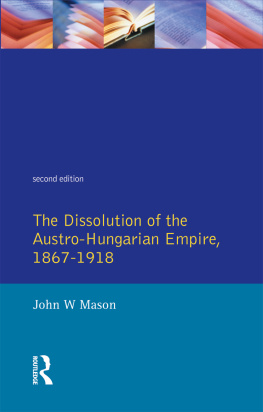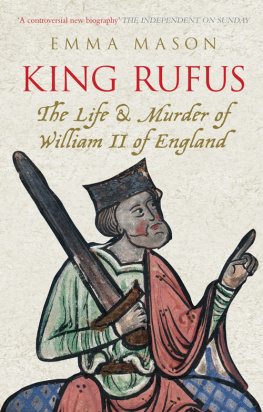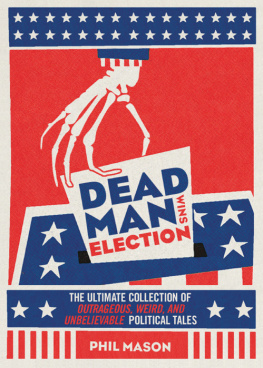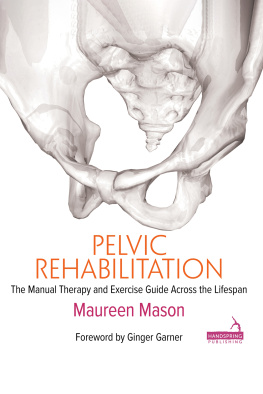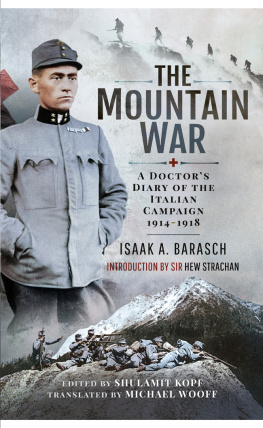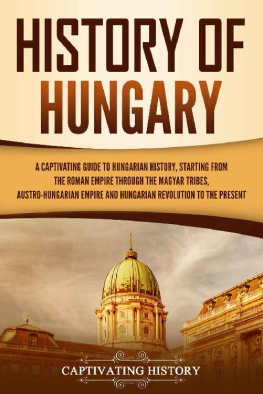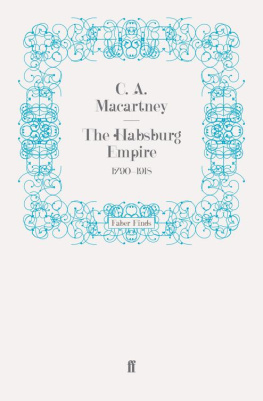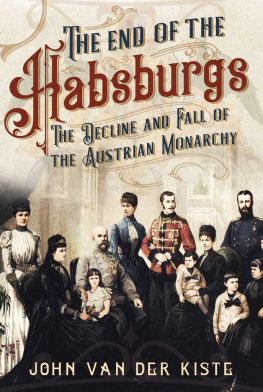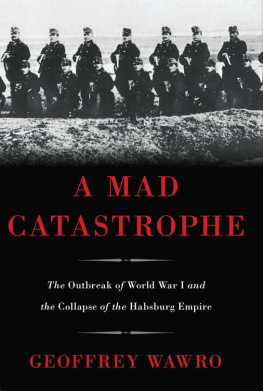
THE DISSOLUTION OF THE AUSTRO-HUNGARIAN EMPIRE, 18671918
The Dissolution of the Austro-Hungarian Empire, 18671918
SECOND EDITION
JOHN W. MASON

First published 1985 by Pearson Education Limited
Second Edition 1997
Published 2013 by Routledge
2 Park Square, Milton Park, Abingdon, Oxon OX14 4RN
711 Third Avenue, New York, NY 10017, USA
Routledge is an imprint of the Taylor & Francis Group, an informa business
Copyright 1985, 1997, Taylor & Francis.
The right of John W. Mason to be identified as author of this Work has been asserted by him in accordance with the Copyright, Designs and Patents Act 1988.
All rights reserved. No part of this book may be reprinted or reproduced or utilised in any form or by any electronic, mechanical, or other means, now known or hereafter invented, including photocopying and recording, or in any information storage or retrieval system, without permission in writing from the publishers.
Notices
Knowledge and best practice in this field are constantly changing. As new research and experience broaden our understanding, changes in research methods, professional practices, or medical treatment may become necessary.
Practitioners and researchers must always rely on their own experience and knowledge in evaluating and using any information, methods, compounds, or experiments described herein. In using such information or methods they should be mindful of their own safety and the safety of others, including parties for whom they have a professional responsibility.
To the fullest extent of the law, neither the Publisher nor the authors, contributors, or editors, assume any liability for any injury and/or damage to persons or property as a matter of products liability, negligence or otherwise, or from any use or operation of any methods, products, instructions, or ideas contained in the material herein.
ISBN 13: 978-0-582-29466-0 (pbk)
British Library Cataloguing in Publication Data
A catalogue record for this book is available from the British Library
Library of Congress Cataloging-in-Publication Data
Mason, John W., 1939
The dissolution of the Austro-Hungarian Empire 18671918 / John W. Mason. -- 2nd ed.
p. cm. -- (Seminar studies in history)
Includes bibliographical references and index.
ISBN 0-582-29466-5
1. Austria--History--18671918. 2. Austria--Ethnic relations. 3. Austria--Economic conditions--To 1918. 4. Nationalism--Austria.
I. Title. II. Series.
DB86.M36 1997
943.6044--dc20
96-32785
CIP
Set by 7 in 10/12 Sabon
CONTENTS
Such is the pace of historical enquiry in the modern world that there is an ever-widening gap between the specialist article or monograph, incorporating the results of current research, and general surveys, which inevitably become out of date. Seminar Studies in History are designed to bridge this gap. The series was founded by Patrick Richardson in 1966 and his aim was to cover major themes in British, European and World history. Between 1980 and 1996 Roger Lockyer continued his work, before handing the editorship over to Clive Emsley and Gordon Martel. Clive Emsley is Professor of History at the Open University, while Gordon Martel is Professor of International History at the University of Northern British Columbia, Canada and Senior Research Fellow at De Montfort University.
All the books are written by experts in their field who are not only familiar with the latest research but have often contributed to it. They are frequently revised, in order to take account of new information and interpretations. They provide a selection of documents to illustrate major themes and provoke discussion, and also a guide to further reading. The aim of Seminar Studies is to clarify complex issues without over-simplifying them, and to stimulate readers into deepening their knowledge and understanding of major themes and topics.
Readers should note that numbers in square brackets [] refers readers to the corresponding item in the Documents section which follows the main text.
The publishers would like to thank the following for permission to reproduce copyright material;
Cambridge University Press for extracts from Neo-Slavism and the Czechs 18941914, by P. Vysny published in 1977; Banking and Industrialization in Austria-Hungary, The Role of Banks in the Industrialization of the Czech Crownlands 18731914, by R.L. Rudolph published in 1976; Austria-Hungary by L. Eisenmann in The Cambridge Modern History, Vol 12 published in 1910; Thames and Hudson Ltd. for an extract from My Life by Oscar Kokoschka published in 1974; Papermac for an extract from Last Waltz in Vienna, by George Clare; Thomas Barry-Braunthal for an extract from In Search of the Millenium, by Julius Braunthal; Professor Solomon Wank for an extract from Central European History, Vol 26 published in 1993; Excerpts from Mein Kampf by Adolf Hitler, translated by Ralph Manheim. Copyright 1943, renewed 1971 by Houghton Mifflin Company. Reprinted by permission of Houghton Mifflin Company. All rights reserved; The Estate of Ralph Manheim for an extract from Mein Kampf published by Pimlico.
Whilst every effort has been made to trace the owners of copyright material, in a few cases this has proved to be problematic and so we take this opportunity to offer our apologies to any copyright holders whose rights we may have unwittingly infringed.
The Austro-Hungarian Empire is one of the great lost causes of modern European history. Yet lost causes have perhaps as much to tell us as successes in history. The central problem of the Habsburg Monarchy in its last fifty years (18671918) was how a multinational empire, knit together by dynastic ties, could adjust and survive in an age of nationalism and democracy. Four specific internal problems can be identified: (1) the failure to solve the Czech-German conflict in the 1880s and 1890s; (2) the failure to develop a genuine parliamentary government in the late 1890s; (3) the failure to solve the Austrian-Hungarian conflict in the early 1900s; (4) the failure to solve the South Slav conflict in the decade before World War One.
Domestic failure led to foreign-policy disaster. On 28 June 1914 the heir-apparent to the Habsburg throne, Franz Ferdinand, was shot in Sarajevo by a Bosnian nationalist. This event sparked off World War One and the war caused the Monarchy to collapse in 1918. The Habsburg Monarchy was certainly not in a healthy state before 1914. But it would be a great mistake to see it as foredoomed to fall because of our knowledge of what happened to it in the last year of the war.
The same empire which struggled with these political problems formed the seed-bed of many of the most important ideas and cultural achievements of the twentieth century. In Vienna Zionism, as well as its opposite, racial anti-semitism, was born. The young Adolf Hitler acquired his political education on the streets of the polyglot capital in the early years of the twentieth century. Vienna, more than any other city in Europe, epitomized the breakdown of liberalism at the time and paved the way for the mass movements in politics and the beginnings of the modern movement in music, art, literature, psychology and philosophy.
I wish to thank both Roger Lockyer for his helpful editorial guidance and the British Academy for a Humanities grant, which enabled me to undertake research in Vienna in the summer of 1983.
Next page
